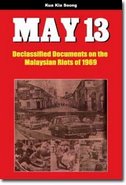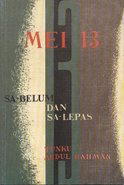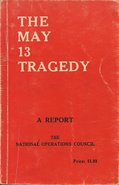
SIngapura sering diguna pihak cauvanis CIna sebagai model negara maju, tetapi negara yang 75% kaum Cina pun tidak mengamalkan sistem sekolah vernakular. Malah Lee Kuan Yew sendiri memperakui sistem dwibahasa melibatkan bahasa CIna yang dijalankan di Singapura pun tidak berjaya.
Baca artikel berikut:
Anguish over bilingualismBaca juga tulisan blog Bonjour Planet Earth bertajuk Singapore icon Lee Kuan Yew admits that bilinguism policy in education was a serious mistake....
INSIGHT DOWN SOUTH
By SEAH CHIANG NEE
There’s renewed debate over the decades-old language grind after surprising remarks by the architect of the republic’s bilingual education policy.
FOUR decades of bilingual education have been shaken up by its architect Lee Kuan Yew, who now says it was a mistake from the beginning.
In a rare self-criticism, the 86-year-old Minister Mentor blamed it on his own ignorance in thinking that people could easily master two languages.
It showed a side of him that Singaporeans rarely get to see or hear – expressing contrition in such harsh tones about himself for something he did four decades ago.
Over state TV, he said recently that he was “wrong” to have insisted on the bilingual policy, which was launched in 1966.
“At first I thought, you can master two languages. Maybe different intelligence, you master it at different levels,” he said, but after 40 years of learning it, he was convinced otherwise.
“We started the wrong way,” said Lee. “We insisted on ting xie (listening), mo xie (dictation) – madness!
“Nobody can master two languages at the same level. If (you think) you can, you’re deceiving yourself.”
As a result, Lee added: “Successive generations of students paid a heavy price, because of my ignorance, by my insistence on bilingualism.”
It was as close to a public apology as Singaporeans are likely to get.
Most observers saw it as his retraction of a major strategy that he introduced for his multiracial people. The republic’s bilingual system is watched with interest by many multiracial countries in Asia.
Under the system, aimed at bonding races and cultures, English is taught to all — but ethnic Chinese, Malay and Indian students need a mandatory pass in their own mother tongue.
The rationale is simple and logical. Singaporeans can communicate with each other, and the outside world, in English, as well as use it to earn a living. At home, however, they are encouraged to speak their mother tongue.
For the Malays and Indians, learning Bahasa Melayu and Tamil has not been too difficult, but among Chinese who hail from English-speaking homes, passing – let alone mastering – Chinese, a totally dissimilar language, is very tough.
Lee’s remarks were immediately taken by many Singaporeans as an indication that the government plans to do away with the policy.
This is unlikely to happen, particularly with the emerging economic power of China and Singapore wanting to serve as a bridge between Beijing and the West.
Prime Minister Lee Hsien Loong quickly put paid to that speculation, saying: “To put it very simply, we are affirming our bilingualism policy. We have never wavered in this fundamental...”
However, PM Lee said, “We are in a dynamic situation because the position is changing, and we have been updating our policies progressively.” Lee Senior put the future this way: “It doesn’t matter what level (of Chinese) they reach, they will like the language, it is fun, and later on in life they’ll use it.”
The study of Chinese has undergone changes since 2004 that make the process less torturous for English-speaking Chinese.
The aim is for the average Chinese here to continue to be bilingual in English and Chinese, but without forcing him to master Chinese as well as English.
Those with higher abilities to do so could choose a fast and higher Chinese language track. Some have been sent to top universities in China.
The change of mind may have come too late for the hundreds of thousands who have gone through the language grind in the past four decades.
Many of them had adopted the attitude of just doing enough to pass exams, realising they wouldn’t need to use it for much of their working lives.
One out of four people surveyed said they considered it unnecessary to learn Chinese in this global world, where even the Chinese themselves are flocking to learn English.
A former Singapore scholar recently blogged: “I am a typical byproduct of Singapore: a Chinese who can speak Mandarin, passed Mandarin classes but can still barely read and write the language well enough to be considered proficient.
“Technically I am illiterate,” he declared. “And, while that may not speak for all of us, there are sufficient numbers to justify the label ‘typical’”. The worst cases are the talented children who fared so miserably in Mandarin that they had to continue their studies abroad.
An early casualty of Singapore’s bilingualism was the Golden Girl of swimming, Junie Sng, who won 10 gold medals in the 1983 SEA Games, compared to nine four years earlier.
Her English-speaking parents migrated to Australia, where she now resides. The Chinese language dilemma has contributed to Singapore’s brain drain.
Every year, about 1,000 bright students join the immigration outflow, including a fair number who want to escape the exam requirements.
In 1989, a Singaporean mother, Pauline Tan, wrote a passionate letter to The Straits Times criticising the way Chinese was being taught.
She said her Primary 3 son was having suicidal thoughts because he hated having to study Chinese every day. “He was constantly ridiculed and scolded by his Chinese teacher. He felt ashamed and shunned his classmates.
“He found Chinese boring. It is spelling, dictation, writing, tests and more spelling, dictation, writing and tests,” she said. Finally she and her husband migrated to Australia “to spare our kid further misery with Chinese.”
Today, her son – aged 29 – is an IT specialist, while his younger brother is doing his doctorate in mathematics at Oxford University.
It is partly such losses that have forced Singapore to import talent from abroad – and probably explains Lee’s feeling of anguish.
Source: The Star, December 19th, 2009
Apa lagi Dong Zong mahu guna sebagai hujah jika tidak sikap racis cauvanis dan keengganan berintegrasi sebagai 1Malaysia.
























3 ulasan:
malaysian malaysia konon, pegi dah!!!
Macam mana nak berjaya. benda dah hancurpun. rakyat singapura dh pandang kehidupan ala barat. itulah kejayaan british menanam ideologi mereka dalam pemikiran rakyat singapura. 10 tahun lagi rakyat malaysia macam tu jugak. rakyat malaysia hari ini dan permerintah malaysia telah di brainwash oleh british. Pemikir british adalah Yahudi. "Sistem Divide and rule" sudah menular dalam masyarkat kita. Bukan sahaja menular, dah jadi sebati dalam nasyrakat kita. sistem yang digunakan olrh British untuk jatuhkan empayar Uthmaniah iaitu empayar terbesar islam pada ketika dulu. Sistem divide and rule ini lah yang orang-orang melayu pada hari ini agung-agungkan. terutama Barisan Nasional dan Utusan.
Inilah Kejayaan Perang Salib yang sebenar.
Sekarang PM Najib baru sedar, barulah nak buat 1 Malaysia. Lebih baik sedar dari tak sedar langsung.
Kepada e-Patriot SSS,
Sempena kita melangkah ke tahun 2010, kami di Satu Sekolah Untuk Semua (SSS) ingin menghulurkan setinggi perhargaan dan terimakasih kepada Tun/Tan Sri/Puan Sri/Dato Seri/Datin Seri/Tunku/Tengku/Tuan/Puan di atas sokongan padu yang kami terima terhadap kempen SSS ini.
Kami juga ingin mengambil kesempatan ini untuk kita sama-sama menyemarakkan lagi sokongan terhadap kempen ini dengan melibatkan saudara mara dan sahabat handai yang masih belum lagi menandatangai petisyen kempen ini di SINI dan juga para bloggers untuk menzahirkan sokongan masing-masing dengan mempamirkan logo SSS di laman blog masing-masing.
Terima kasih sekali lagi atas sokongan padu yang diberikan. Kami amat menghargainya.
Salam Sejahtera,
“SATU BAHASA, SATU BANGSA, SATU NEGARA”
Admin SSS
Catat Ulasan